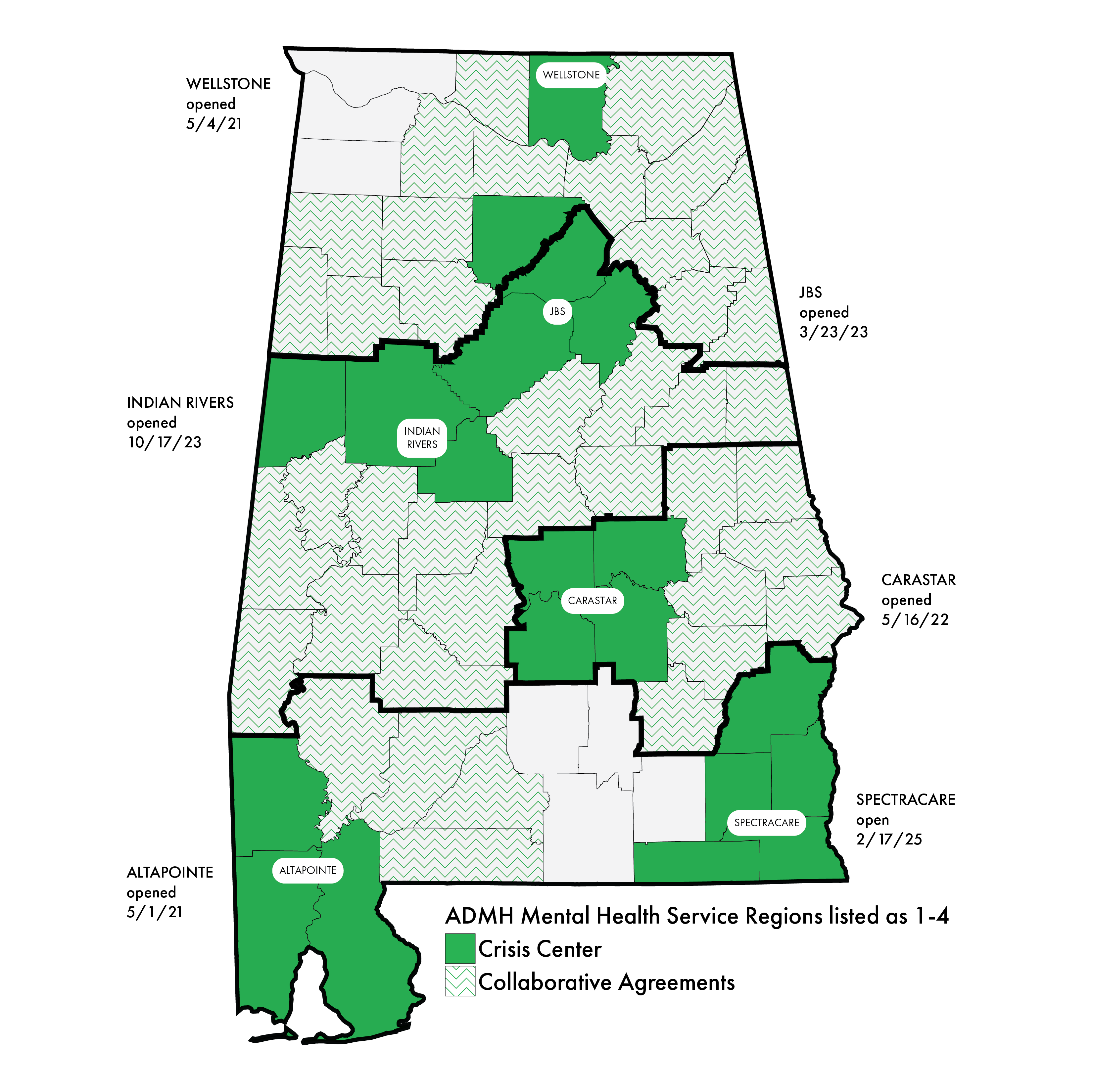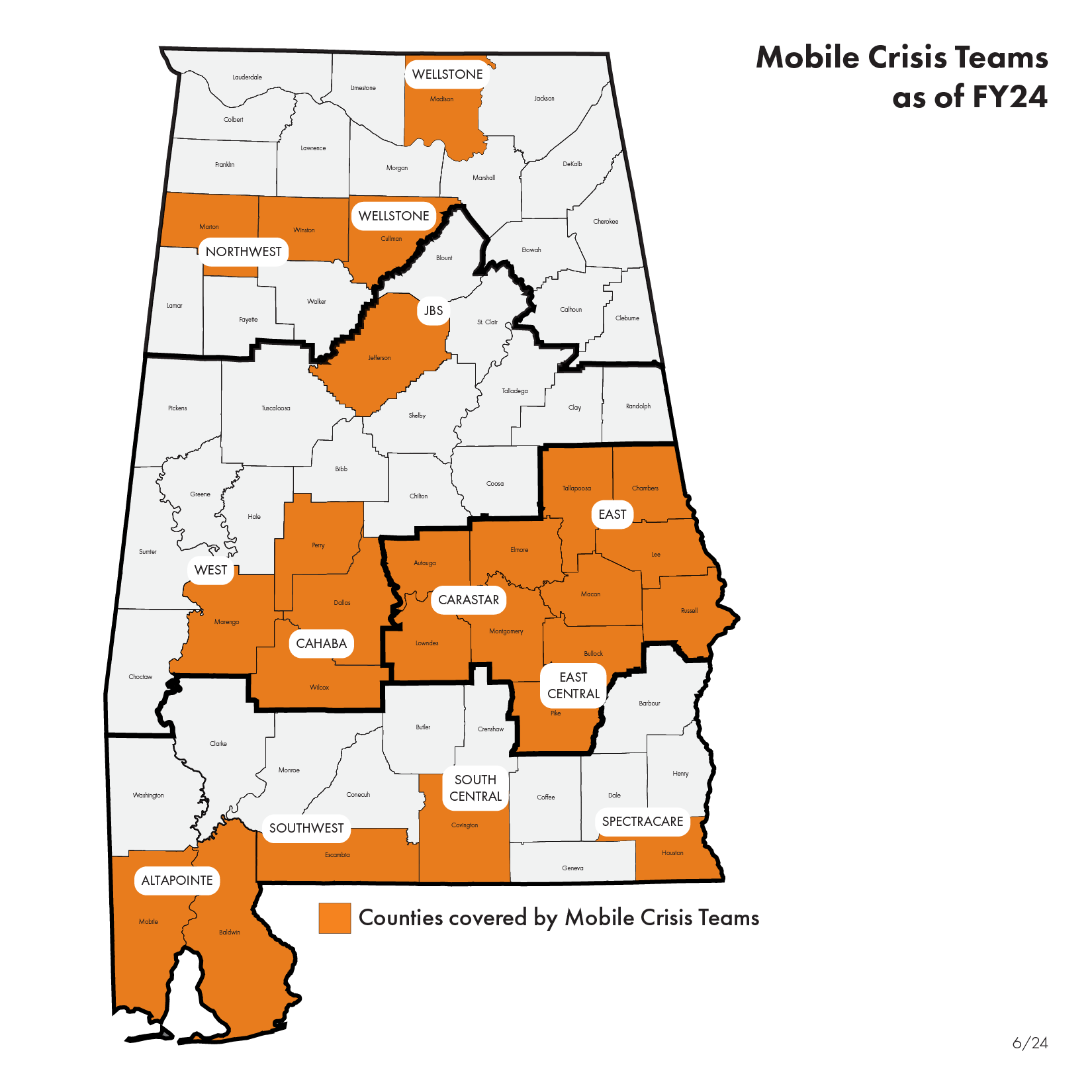No individual is immune from the impact of untreated behavioral health needs. Each year, there are thousands of preventable tragedies that may be addressed with proper mental health resources and access to care. To offer innovative and accessible solutions, the Alabama Crisis System of Care:
- Expands access to care and offers the right care, at the right time, at the right place
- Includes 988, Mobile Crisis Teams, and Crisis Centers
- Assists individuals before a civil commitment may occur
- Reduces the number of arrests
- Decreases frequency of admissions to hospitals
- Provides connections and referrals to agencies and organizations Assists individuals in crisis to achieve stability
- Promotes sustained recovery
- Includes someone to talk to, someone to come to you, and someplace to go
- Creates opportunities for the behavioral health workforce
Gov. Kay Ivey, the Alabama State Legislature, and the Alabama Department of Mental Health have funded six Crisis Centers that offer services at staged levels. These centers improve access to behavioral healthcare services for individuals who are experiencing a mental health, substance use or suicidal crisis, and they aid jails and hospitals throughout the state by alleviating the burden to house and care for individuals in need of services.
ADMH thanks Governor Ivey and legislative investment, which helps to expand and transform the Alabama crisis system of care, dramatically lower healthcare costs, reinvest state dollars, achieve better health outcomes, and improve life for those with acute mental health needs.
Crisis Centers in Alabama are individualized to the unique needs of the communities they serve.
AltaPointe Health: The Behavioral Health Crisis Center is located in Mobile and serves Baldwin, Clark, Conecuh, Escambia, Mobile, Monroe, and Washington Counties.
Behavioral Health Crisis Center | 251-662-8000 | 2401 Gordon Smith Drive, Mobile 36617
Carastar Health (formerly MAMHA): This center is in Montgomery, but serves the entire River Region, and the counties of Chambers, Lee, Russell, and Tallapoosa, in partnership with the community mental health centers of East Alabama and East Central Alabama. Mobile Crisis Services are in operation, in conjunction with law enforcement and first responder partnerships.
Carastar Crisis Center | 800-408-4197 | 5915 Carmichael Road, Montgomery 36117
Indian Rivers Behavioral Health: The Hope Pointe Crisis Center is located in Tuscaloosa and serves: Bibb, Choctaw, Dallas, Greene, Hale, Marengo, Perry, Pickens, Sumter, Wilcox, and Tuscaloosa Counties.
Hope Pointe Behavioral Health Crisis Center | 205-391-4000 | 1401 Greensboro Ave, Tuscaloosa 35401
Jefferson, Blount, St. Clair Behavioral Services: This center is located in Birmingham serving the named counties, in addition to Calhoun, Chilton, Clay, Cleburne, Coosa, Randolph, Shelby, and Talladega Counties.
Craig Crisis Care Center | 205-263-1701 | 401 Beacon Parkway W, Birmingham 35209
SpectraCare Health Systems: The center is located in Dothan and serves Barbour, Dale, Geneva, Henry, and Houston counties.
SpectraCare Crisis Center | 800-951-4357 | 2740 Headland Avenue, Dothan 36303
WellStone: This center is located in Huntsville serving Cullman and Madison counties, and the surrounding counties of Cherokee, Dekalb, Etowah, Fayette, Jackson, Lamar, Lawrence, Limestone, Marion, Marshall, Morgan, Walker, and Winston. Mobile Crisis Services are in operation, in conjunction with law enforcement and first responder partnerships.
WellStone Emergency Services | 256-705-6444 | 4020 Memorial Parkway SW, Huntsville 35802
In addition to creating Crisis Centers, the Alabama Crisis System of Care includes the implementation of 988 and mobile crisis services throughout the state.
988 - The national three-digit phone number for all mental health, substance use, and suicide crises, as of July 16, 2022.
988 is more than just an easy-to-remember number—it’s a direct connection to compassionate, accessible care and support for anyone experiencing mental health-related distress – whether that is thoughts of suicide, mental health or substance use crisis, or any other kind of emotional distress. People can also dial 988 if they are worried about a loved one who may need crisis support.
Mobile Crisis -In our state, 67 counties, 55 are deemed “rural” (ADPH). Many communities, families, and individuals reside in rural areas without the ability to easily travel to a Crisis Center or a community mental health center if a crisis should occur. In order to actively change the model of care and respond to this vital need, the Alabama Department of Mental Health has expanded the Alabama Crisis System of Care to include Mobile Crisis Teams (MCT).
There are now 14 teams at 11 community mental health centers.
The goals for mobile crisis services are aligned with the overarching goals of crisis care, which are to reduce the burden on EDs/Hospitals, reduce the burden on Law Enforcement/Jails, and improve access to the “right care, right time, right place.” Each center will have a mobile crisis team as part of mobile crisis services. The community mental health centers may also include in their crisis services: a co-response with law enforcement and emergency medical personnel, crisis peer support, crisis case management, regional call centers, and respite options.
Stepping Up Alabama Initiative - Stepping Up is a national initiative designed to reduce the number of people who have mental illnesses in jails and hospital emergency departments. This program is so impactful due to the fact that it not only provides services on the individual level but also works on the policy and systems levels to create a continuum of care for individuals with SMI and co-occurring mental illness in these counties. This program works to break down silos and foster relationships that result in providing individuals with the necessary resources and treatment to place them on a positive trajectory.


